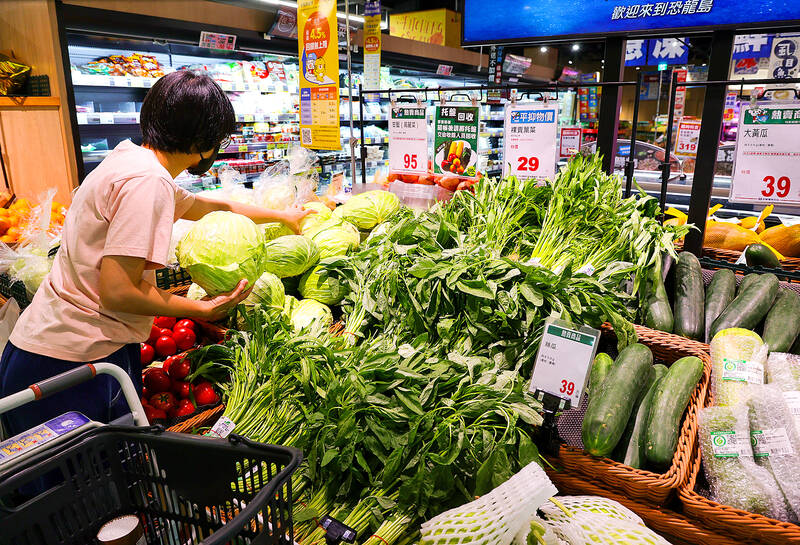The government yesterday offered rare details of its wartime food plan, saying it is taking monthly inventories of crucial supplies such as rice and making sure they are properly stored across the nation in case of a Chinese blockade.
China has over the past five years staged almost daily military activities around Taiwan, including war games that have practiced blockades and attacks on ports.
China’s latest war games around Taiwan, carried out last week, included mock blockades of key ports and areas, and assaults of maritime and ground targets, Beijing said.

Photo: CNA
In a report to the Legislative Yuan about preparations in case of a Chinese blockade, a copy of which was reviewed by Reuters, the Ministry of Agriculture said it has ensured that rice stockpiles were above a three-month level as required by law and that food supplies were stored across the nation in a bid to “lower attack risks.”
Current rice stocks are enough to support the nation for at least seven months and plans on rice rationing through supply stations across the country are being made in case of a food crisis, the ministry said.
During a blockade, more farmland would be used to grow rice, the ministry said, adding that it would prioritize growing sweet potatoes, soybeans and fresh vegetables, as well as using more ponds for aquaculture.
In a scenario in which sea fishing is not allowed, the ministry said the nation’s fish feed inventory would be enough to support fishing in ponds for more than three months.
The ministry said it was planning to set up a task force to ensure food supply safety by taking a monthly inventory of the nation’s food resources.
Taiwan, a farming powerhouse during Japanese colonial rule from 1895 to 1945, depends on imports for the majority of its food needs as farm land was taken over for factories during rapid industrialization starting in the 1960s.
Taiwan’s food self-sufficiency rate last year dropped to an 18-year low of 30.3 percent, a previous report from the ministry said.
In a separate report to the legislature on preparations for the same scenario, the National Security Bureau said China’s cyberforces were honing their skills to infiltrate key online infrastructure such as telecoms in a bid to destabilize Taiwan with misinformation during a conflict with China.
Additionally, over the past two years, China has carried out “joint combat readiness patrols” near Taiwan three to four times per month, it added.
The number of tanker aircraft used for aerial refueling, landing ships and other forces participating in the training has been gradually increased, it said.
“This underscores that the communist military has continued to escalate its military threat against Taiwan in an effort to establish a blockade and control of our external sea lines of communication,” the bureau said.

Taiwan has received more than US$70 million in royalties as of the end of last year from developing the F-16V jet as countries worldwide purchase or upgrade to this popular model, government and military officials said on Saturday. Taiwan funded the development of the F-16V jet and ended up the sole investor as other countries withdrew from the program. Now the F-16V is increasingly popular and countries must pay Taiwan a percentage in royalties when they purchase new F-16V aircraft or upgrade older F-16 models. The next five years are expected to be the peak for these royalties, with Taiwan potentially earning

STAY IN YOUR LANE: As the US and Israel attack Iran, the ministry has warned China not to overstep by including Taiwanese citizens in its evacuation orders The Ministry of Foreign Affairs (MOFA) yesterday rebuked a statement by China’s embassy in Israel that it would evacuate Taiwanese holders of Chinese travel documents from Israel amid the latter’s escalating conflict with Iran. Tensions have risen across the Middle East in the wake of US and Israeli airstrikes on Iran beginning Saturday. China subsequently issued an evacuation notice for its citizens. In a news release, the Chinese embassy in Israel said holders of “Taiwan compatriot permits (台胞證)” issued to Taiwanese nationals by Chinese authorities for travel to China — could register for evacuation to Egypt. In Taipei, the ministry yesterday said Taiwan

Taiwan is awaiting official notification from the US regarding the status of the Agreement on Reciprocal Trade (ART) after the US Supreme Court ruled US President Donald Trump's global tariffs unconstitutional. Speaking to reporters before a legislative hearing today, Premier Cho Jung-tai (卓榮泰) said that Taiwan's negotiation team remains focused on ensuring that the bilateral trade deal remains intact despite the legal challenge to Trump's tariff policy. "The US has pledged to notify its trade partners once the subsequent administrative and legal processes are finalized, and that certainly includes Taiwan," Cho said when asked about opposition parties’ doubts that the ART was

If China chose to invade Taiwan tomorrow, it would only have to sever three undersea fiber-optic cable clusters to cause a data blackout, Jason Hsu (許毓仁), a senior fellow at the Hudson Institute and former Chinese Nationalist Party (KMT) legislator, told a US security panel yesterday. In a Taiwan contingency, cable disruption would be one of the earliest preinvasion actions and the signal that escalation had begun, he said, adding that Taiwan’s current cable repair capabilities are insufficient. The US-China Economic and Security Review Commission (USCC) yesterday held a hearing on US-China Competition Under the Sea, with Hsu speaking on